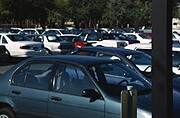- Could Your Grocery Store Meat Be Causing Recurring UTIs?
- Are You Making This Expensive Thermostat Error This Winter?
- Recognizing the Signs of Hypothyroidism
- 10 Strategies to Overcome Insomnia
- Could Artificial Sweeteners Be Aging the Brain Faster?
- Techniques for Soothing Your Nervous System
- Does the Water in Your House Smell Funny? Here’s Why
- Can a Daily Dose of Apple Cider Vinegar Actually Aid Weight Loss?
- 6 Health Beverages That Can Actually Spike Your Blood Sugar
- Treatment Options for Social Anxiety Disorder
Hot Cars Can Quickly Prove Deadly for Kids


Before you decide it’s safe to make a quick dash into the pharmacy while your toddler is asleep in a car seat during the hot months of summer, consider this: More than 600 children in the United States have died of vehicle-related heat stroke since 1998.
Susan Katz, coordinator of the Infant Apnea Program at Stony Brook Children’s Hospital in Stony Brook, N.Y., offered advice about avoiding heat stroke in children.
“Young children are particularly vulnerable, as their bodies’ heat up three to five times faster than an adult’s,” Katz said in a Stony Brook news release. “Even on a mild 70-degree day, the temperature inside of a car can rise 19 degrees in 10 minutes, getting hotter with each passing minute. Contrary to popular belief, cracking the windows does not help.”
Katz suggests remembering three letters — A, C, T — to protect children. The letters stand for:
- A: Avoid heat-related injury and death by never leaving your child alone in the car for any period of time. “Make sure to keep your car locked when you’re not in it, so children don’t get in on their own to play,” she added.
- C: Create reminders. Accidents can occur when parents are rushed or distracted and forget their kids are in the car. “Put something in the back of your seat of your car, next to your child, such as a briefcase, a purse or a cellphone that is needed at your final destination. Set reminders on your mobile devices that are triggered to alarm shortly after your expected arrival time at your final destination,” she suggested.
- T: Take action. “If you see a child alone in a car, call 911,” Katz said. “Emergency personnel want you to call. They are trained to respond to these situations. One call could save a life.”
Katz offered another tip: “Get in the habit of always opening the back door of your vehicle every time you reach your destination, to make sure no child has been left behind. This will soon become a habit and your small passengers will be safe.”
More information
For more tips about avoiding heat problems among children, try The Hospital for Sick Children in Toronto.
Source: HealthDay
Copyright © 2026 HealthDay. All rights reserved.










